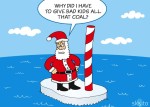On the brink of a mining boom, the town of Mudgee is questioning how its fossil fuel-driven future will reshape the early childhood education landscape. Ingrid Maack visits Mudgee Preschool—one of the biggest early education and care services in NSW.
When I grow up I want to be a miner’, reads the text on a child’s artwork featuring a smiling stick figure with a miner’s lamp and a bag full of coal. The artwork hangs on the wall of a gallery in an exhibition, themed ‘Belonging, Being and Becoming’, organised by staff and children at Mudgee Preschool.
Continue Reading →








